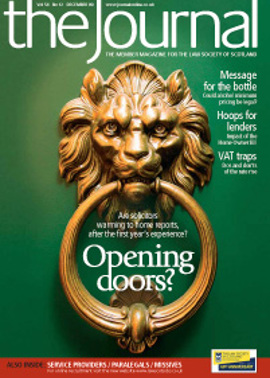On the mark?

Recently the European Court of Justice’s Advocate General, Poiares Maduro, delivered his opinion on the ongoing dispute between Google and three French companies regarding Google’s AdWords service. The opinion had been eagerly awaited by lawyers and brand owners seeking clarity on whether AdWords constitutes trade mark infringement. The opinion, that the service does not in itself constitute an infringement, has been met with surprise and leaves much uncertainty pending the final decision of the court.
Google AdWords is a service whereby parties can pay to have their web address displayed as a “sponsored link” on the Google results page. The service centres on “keywords” which, when entered into the search engine, trigger the return of sponsored web links. Controversy centres on the fact that one party can obtain the AdWords for another party’s trade marks. For example Adidas could obtain the AdWord, “Nike”. Brand owners have been concerned about this, particularly with regard to potential misuse by the sellers of counterfeit goods. Indeed one of the French actions referred to the ECJ concerns Louis Vuitton and a counterfeiter.
Limited use
The Advocate General considered article 5 of the Trade Mark Directive (89/104), which forms the basis of UK trade mark legislation. Central to his assessment was his interpretation of article 5(1), which sets out the grounds for trade mark infringement. He opined that there are four cumulative conditions in relation to the use of trade mark(s) which must be met in order to establish infringement, namely:
- the owner of the relevant mark(s) must not consent to the use;
- the use must be in the course of trade;
- the use must relate to goods or services which are identical or similar to those covered by the trade mark(s); and
- the use affects or is liable to affect the essential function of the trade mark(s) (to guarantee to consumers the origin of the goods or services), by reason of a likelihood of confusion on the part of the public.
Whilst the Advocate General considered that the first two conditions had been satisfied, he opined that permitting advertisers to select AdWords keywords which correspond to trade marks, so that adverts for sites are presented as results of searches involving those keywords, does not meet the conditions required to establish infringement. He commented: “no good or service is sold to the general public. The use is limited to a selection procedure which is internal to AdWords and concerns only Google and the advertisers. The service being sold, and to which the use of the keywords corresponding to the trade mark is linked, is therefore Google’s own service, AdWords”.
Furthermore, he did not consider that the essential functions of trade marks are compromised, commenting: “uses by Google, in AdWords, of keywords which correspond to trade marks do not affect the other functions of the trade mark, namely guaranteeing the quality of the goods or services”.
Whilst in his opinion infringement had not been established, reference was made to the trade mark proprietor’s right to address issues under national liability laws if specific occurrences giving rise to illegal damage to their trade mark could be shown.
Reaction and follow-up
There are some who support the Advocate General’s opinion, especially those who wish to restrict the scope of the exclusivity afforded to trade mark owners. Indeed the Advocate General was concerned that a finding of infringement by the ECJ would extend trade mark protection, “to rule in effect, that the mere possibility that a system – in the present cases, AdWords – may be used by a third party to infringe a trade mark means that a system is, itself, in infringement”.
There are many, however, who have been surprised by and are critical of the opinion. Obviously it has not been welcomed by brand owners, who will now have to consider AdWords, and their associated costs, as an additional strand of their brand protection and marketing policy. There has also been legal criticism, with some commentators arguing that the Advocate General has misinterpreted article 5(1) as there is not always a need to show a likelihood of confusion to establish trade mark infringement.
Whilst Google will surely be delighted, the final judgment of the ECJ is awaited and although an Advocate General’s opinion is persuasive, it is non-binding.
In the interim the position is far from clear. It is worth noting that a French court ordered eBay to pay the Louis Vuitton Moet Hennessy group €80,000 for using the group’s trade marks as “keywords” only the day before the release of this opinion.
The final decision of the ECJ is expected next year. Hopefully this will offer some certainty on these matters. Until then, brand owners would be wise to evaluate their key brands and whether AdWords should be obtained to maintain their value.
Ross Nicol, Associate, Maclay Murray & Spens LLP
In this issue
- Home reports have devastated the Scottish house market
- Review of the Fatal Accident Inquiry Legislation
- The Gill Review: a personal injury practitioner’s perspective
- A tale for our times
- A step too far?
- Report card
- Down the slipway
- Homing instinct
- Bottle for a contest
- Ready for the VAT rise?
- New website to promote training openings
- First solicitor advocates approved as "senior"
- Your feedback
- The very definition of paralegal
- Law reform update
- Lawyers can network too
- Ask Ash
- Welcome, user! (and you're sued)
- Communication, communication, communication
- Keeping the peace
- On the mark?
- Crown disclosure: the next level
- Tackling improvements
- Camera angles
- Cutting red tape in Europe
- Scottish Solicitors' Discipline Tribunal
- Website review
- Book reviews
- Calling the shots
- Sector "rising to challenge": Millar
- "One size" is a dodgy fit
- BSA brings in standard instructions
- A new burden is born






